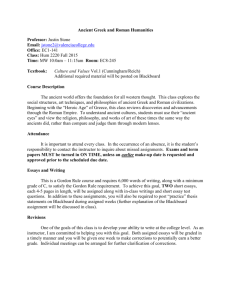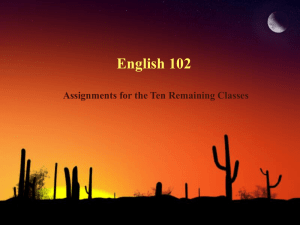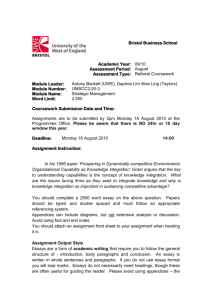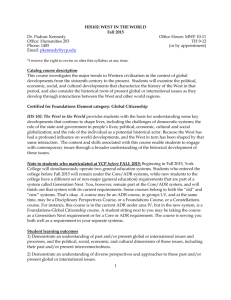british literature – engl 2120-01
advertisement
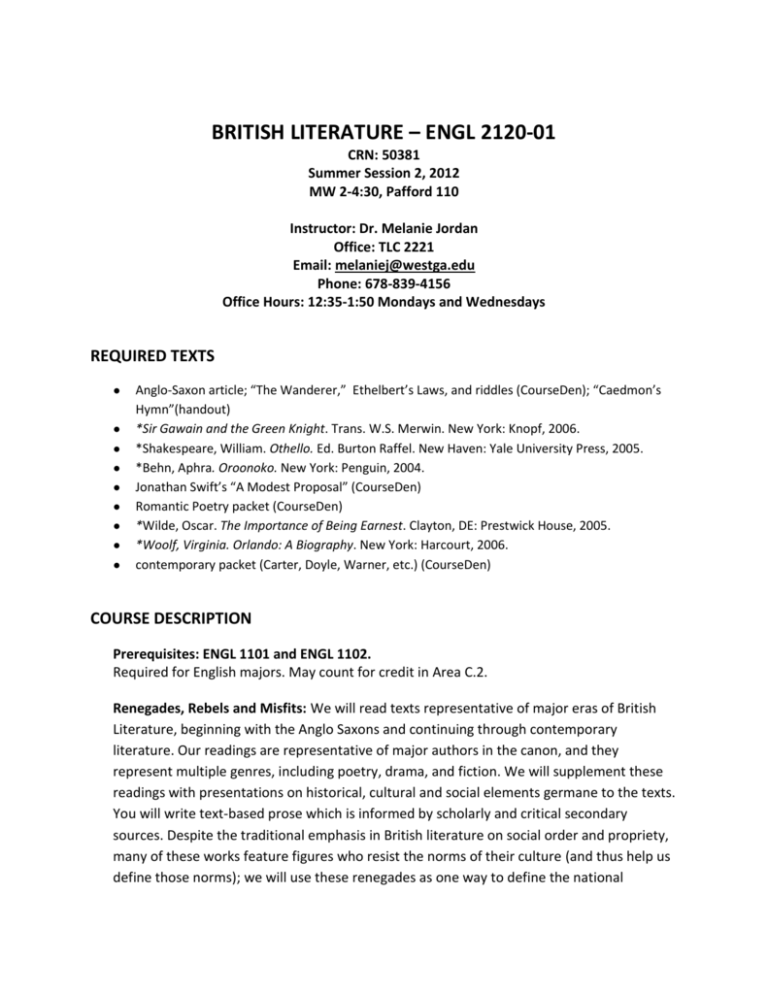
BRITISH LITERATURE – ENGL 2120-01 CRN: 50381 Summer Session 2, 2012 MW 2-4:30, Pafford 110 Instructor: Dr. Melanie Jordan Office: TLC 2221 Email: melaniej@westga.edu Phone: 678-839-4156 Office Hours: 12:35-1:50 Mondays and Wednesdays REQUIRED TEXTS ● ● ● ● ● ● ● ● ● Anglo-Saxon article; “The Wanderer,” Ethelbert’s Laws, and riddles (CourseDen); “Caedmon’s Hymn”(handout) *Sir Gawain and the Green Knight. Trans. W.S. Merwin. New York: Knopf, 2006. *Shakespeare, William. Othello. Ed. Burton Raffel. New Haven: Yale University Press, 2005. *Behn, Aphra. Oroonoko. New York: Penguin, 2004. Jonathan Swift’s “A Modest Proposal” (CourseDen) Romantic Poetry packet (CourseDen) *Wilde, Oscar. The Importance of Being Earnest. Clayton, DE: Prestwick House, 2005. *Woolf, Virginia. Orlando: A Biography. New York: Harcourt, 2006. contemporary packet (Carter, Doyle, Warner, etc.) (CourseDen) COURSE DESCRIPTION Prerequisites: ENGL 1101 and ENGL 1102. Required for English majors. May count for credit in Area C.2. Renegades, Rebels and Misfits: We will read texts representative of major eras of British Literature, beginning with the Anglo Saxons and continuing through contemporary literature. Our readings are representative of major authors in the canon, and they represent multiple genres, including poetry, drama, and fiction. We will supplement these readings with presentations on historical, cultural and social elements germane to the texts. You will write text-based prose which is informed by scholarly and critical secondary sources. Despite the traditional emphasis in British literature on social order and propriety, many of these works feature figures who resist the norms of their culture (and thus help us define those norms); we will use these renegades as one way to define the national literature of Britain. This isn’t the only topic, of course – it’s merely a way to begin grappling with the material. REQUIRED MATERIALS a functioning CourseDen account which you are expected to check daily a working, cleaned-out, westga email address a word processing program (compatible with Microsoft Word) reliable access to a printer (for printing assignments/homework before class) a flash drive or some other portable electronic storage ATTENDANCE: This class requires not only your attention to keeping up with the reading but also your regular attendance. Missing one class is equivalent to missing a week in a normal semester. All assignments must be turned in to me personally, and those are always due at the beginning of class. If you are not present to do so, your grade will drop. If you should miss four or more classes, you will not pass. COURSE REQUIREMENTS Reading Responses (guided and independent) Midterm Exam (ID and Discussion) Final Exam (ID and Discussion) Essay (5-8 pages; scholarly article synthesis and response ) Dramatic Project (5-8 pages) Presentation (deals with a cultural, historical, or societal aspect of one of our texts; combines scholarly and creative faculties) Reading Responses will be due at the beginning of class (hard copy). We’ll have one for most class periods. These Responses cannot be turned in late. Sometimes I will provide specific questions for your response –sometimes I will ask you to choose your own focus on the text. They will be graded on a 20-pt scale: 18-20=excellent; 16-17=very good; 14-15=average; 12-13=needs focus and/or development; less than 10=failing. You may be called on in class to read from or discuss your responses, and they may provide fodder for essays. Midterm and Final Exams: These will contain passages for identification (author, title, character, function in the text, etc.). They may also contain discussion questions that respond to topics we’ve discussed in class, through presentations, and through Reading Responses. Essay: This essay, due early in the term, will require the explication of 1-2 scholarly articles and a synthesis of those articles from your own perceptions. The Reading Responses often function as brainstorming for this essay. Dramatic Project: You will choose one of the two major plays we discuss this semester, and you will write a project that deals with the dramatic and thematic elements of that play. I will provide specific instructions for this project. Presentation: This presentation will ask you to present at least one critical or scholarly article that sheds light on a topic of social, cultural, or political importance pertaining to one major text. It will also ask you to choose a topic that lends itself to connections to our texts—I will provide suggestions, though students are also encouraged to choose their own as well. ASSIGNMENTS Reading Responses Essay Dramatic Project Midterm exam Presentation Final exam Total possible: 660 8@20pts. = 160 pts. 100 pts. 100 pts. 100 pts. 100 pts. 100 pts. ASSIGNMENT PERCENTAGES Responses: 24% Essay: 15% Dramatic Project: 15% Exams: 30% Presentation: 15% *These are rough percentages. The remainders account for the last percentage point, if you were wondering why these only add up to 99%!* GRADING Overall: This class is run on a “total points” system. You can figure your grade at any time by simply dividing the sum of your earned points by the total possible points at that time. Essays: The English Department’s 2000-level and above grading rubric is available on the English Department Website. Essays will be graded according to this rubric. You may convert written numerical grades to letter grades and vice versa (for out-of-class essays and final averages) using the following scale. Remember that final averages do not include plus or minus designations. A+=98-100%, A =95-97%, A-=90-94% B+=88-89%, B= 85-87% B-=80-84% C+=78-79%, C=75-77%, C-=70-74% D+=68-69%, D=65-67%, D-=60-64% F=Below 60% (often 50%) GRADE QUERIES: After final grades have been posted, if you feel I have made a clerical or mathematical error, I will be happy to check the math again. However, requests to re-consider final grades based on effort or eligibility (for scholarships, extracurricular activities, etc.) will not be honored. Likewise, requests to assign or grade work after the final exam will not be considered. All final grades will be posted on Banweb following the final exam period. No grades will be distributed via phone or email. WORK SUBMISSION POLICIES: The Essay and Dramatic Project should be submitted in hard copy as well as on CourseDen. Submit essays electronically before class time, then bring the printed copy to the class during which it is due. All assignments are due at the beginning of class. Follow individual assignment sheet instructions. Those will be provided on CourseDen. All Reading Responses are due in hard copy at the beginning of class. After the class period for which they are due passes, they will not be accepted. In case of emergency, contact me immediately before any assignment is due to make arrangements. All essays and documentation should be in MLA format (Writer’s Resource, tab 6). All assignments referring to any text require correct documentation. Any work incorrectly formatted or unprofessionally presented may be refused. EXTRA CREDIT AND PREVIOUS WORK POLICY: No extra credit will be offered for this course. Work completed for a previous course will not be accepted in this course. LATE WORK: The Essay and Dramatic Project may be submitted late with the following stipulations. They will receive a 10-pt. deduction per class period. If any of these assignments is submitted more than a calendar week after the original due date, it will receive a 0. A missed exam may be made up at my discretion; legitimate proof (of illness, accident, etc.) for the original absence must be provided within 24 hours of the absence, and that essay must be made up within 72 hours, given the summer abbreviation of the course. PLAGIARISM AND ACADEMIC HONESTY: The Department of English and Philosophy defines plagiarism as taking personal credit for the words and ideas of others as they are presented in electronic, print, and verbal sources. The Department expects that students will accurately credit sources in all assignments. An equally dishonest practice is fabricating sources or facts; it is another form of misrepresenting the truth. Plagiarism is grounds for failing the course. (See also Excessive Collaboration) The University policies for handling Academic Dishonesty are found in the following documents: The Faculty Handbook, sections 207 and 208.0401 http://www.westga.edu/~vpaa/handrev/ (Item 207 in the left-hand navigation bar) Student Uncatalog: "Rights and Responsibilities"; Appendix J. (http://www.westga.edu/assets/docs/studentHandbook2007.pdf) http://www.westga.edu/handbook The Student Handbook also addresses plagiarism and academic dishonesty under “Honor Code,” Appendix A and Appendix E (“Procedure for Appeals of Grade Determination and Academic Dishonesty). A Writer’s Resource likewise contains accepted definitions and regulations relevant to avoiding plagiarism – see Chapter 23 and Tab 6 for more information. EXCESSIVE COLLABORATION: By the end of the term in both ENGL 1101 and 1102, students should demonstrate the ability to produce independent writing (writing without collaborative assistance of peers, writing tutors, or professionals in the field) that shows an acceptable level of competence. Although classroom activities and out-of-class assignments may highlight collaborative learning and collaborative research, excessive collaboration (collaboration that results in the loss of a student's voice/style and original claims to course related work) is considered another form of academic dishonesty and therefore will not be permitted. Plagiarism is grounds for failing the course. Any individual assignment that exhibits evidence of plagiarism, intentional or unintentional, will earn a grade of 0. Furthermore, if plagiarism is substantiated, the result may be an F in the course; if plagiarism occurs, it may have repercussions at the university level. Acceptable Secondary/Research Sources: College-level sources are a must. Do not rely on sources such as wiki/Wikipedia pages, dictionaries, or overly general reference sources. The kind of writing you are engaging in is much more specific and focused; as a result, your sources should be specific and credible according to collegiate guidelines stated in A Writer’s Resource. While general sources like Wikipedia may provide excellent beginning places for research, they cannot stand without further expansion into credible collegiate sources. Assignments that do not conform to this requirement may be refused or receive an instant D as they will not fit assignment criteria. I strongly recommend Ingram Library’s GALILEO and other electronic sources. COURSE GOALS ● ● ● ● ● Students will develop the ability to recognize and identify significant achievements in British literature. Students will understand the relevant social, historical, and aesthetic contexts of these literary works. Students will appreciate the implications of theoretical and critical approaches to such literature. Students will develop enhanced cultural awareness and analytical skills. Students will demonstrate their command of academic English and of the tenets of sound composition by means of thesis-driven analytical prose. Program Goals Oral and written communication will be characterized by clarity, critical analysis, logic, coherence, persuasion, precision, and rhetorical awareness (Core Curriculum learning outcomes I) Cultural and Social Perspectives: Cultural and social perspective will be characterized by cultural awareness and an understanding of the complexity and dynamic nature of social/political/economic systems; human and institutional behavior, values, and belief systems; historical and spatial relationship; and, flexibility, open-mindedness, and tolerance. (Core Curriculum learning outcomes III) Aesthetic Perspective: Aesthetic perspective will be characterized by critical appreciation of and ability to make informed aesthetic judgments about the arts of various cultures as media for human expression (Core Curriculum learning outcomes V) This course fulfills the Area C.2 requirement in the core for all students. Area C (Humanities/Arts) Learning Outcomes: 1. To develop the ability to recognize and identify achievements in literary, fine and performing arts; 2. To have an appreciation of the nature and achievements of the arts and humanities; and 3. To develop the ability to apply, understand, and appreciate the application of aesthetics criteria to “real world circumstances.” ● This course fulfills an Area F requirement for English majors (all tracks) in the core. ● This course fulfills one of the core-level language arts requirements for Middle Grades Education majors. ● This course contributes to the program goal of equipping students with a foundation in literary history and the issues surrounding literary study in contemporary culture. ● This course broadens students' desire and ability to take pleasure in their encounter with literature. CLASS CALENDAR (READINGS AND ASSIGNMENTS) *Expect Reading Responses to be due at the beginning of each class during which we discuss readings unless otherwise noted. Often I will give you directions for those during the class period before. See CourseDen for updates and announcements.* ANGLO-SAXON/MEDIEVAL Week 1 4 June, Monday: Class begins; intro to course, housekeeping, syllabus, notes on Anglo-Saxon culture and poetry; Beowulf discussion and “Caedmon’s Hymn” 5 June, Tuesday: Registration Ends 6 June, Wednesday: National Geographic article, “The Wanderer,” Ethelbert’s Laws, and riddles all due today (CourseDen) Week 2 11 June, Monday: Merwin’s “Foreward” and Sir Gawain and the Green Knight pp. 3-77 due 13 June, Wednesday: Sir Gawain and the Green Knight pp.79-171 due Week 3 ELIZABETHAN 18 June, Monday: intro material about Elizabethan era and Othello pp.3-126 due 20 June, Wednesday: Othello, pp.127-204 due; discussion of midterm exam and upcoming essay Week 4 RESTORATION AND 18th CENTURY 25 June, Monday: MIDTERM EXAM (1.5 hrs.); intro material about Behn and her era; begin Oroonoko (xv-xxxiii + 3-37 due); any concerns about withdrawal date addressed 26 June, Tuesday: LAST DAY TO WITHDRAW WITH A “W” 27 June, Wednesday: ESSAY #1 DUE (submit electronic copy on CourseDen before class and bring hard copy to class); Oroonoko (38-77) and Swift’s “A Modest Proposal” due ROMANTICS Week 5 2 July, Monday: intro material for Romantics; Romantic poetry packet due (CourseDen) 4 July, Wednesday: INDEPENDENCE DAY HOLIDAY (no class, offices closed) VICTORIAN Week 6 9 July, Monday: intro material for Victorians; Importance of Being Earnest (1st half) 11 July, Wednesday: Importance of Being Earnest (finish) MODERN Week 7 16 July, Monday: Orlando, pp. 11-112 due; questions about drama project (we’ll devote some class time at the end to working on these if necessary) 18 July, Wednesday: Orlando, pp.113-end due; DRAMA PROJECTS DUE CONTEMPORARY 23 July, Monday: contemporary short stories/poems due (CourseDen) 25 July, Wednesday: Presentations ; preparation for final exam 27 July, Friday: FINAL EXAM 3-5pm 28 July, Saturday: Graduation 30 July, Monday: grades due by noon


